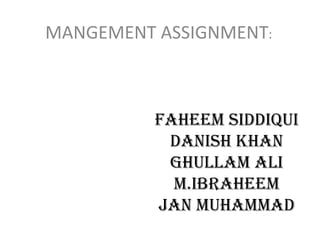
Faheem.mgt presentation
- 1. MANGEMENT ASSIGNMENT: FAHEEM SIDDIQUI Danish Khan Ghullam Ali M.Ibraheem Jan Muhammad
- 2. HOW LEADERS INFLUENCE OTHERS: SOURCES OF LEADERS POWER LEGITIMATE POWER REWARD POWER COERCIEVE POWER EXPERT POWER INFORMATION POWER REFRENT POWER
- 3. EFFECTIVE USE OF LEADER POWER Resistance = Coercion power Compliance= Legitimate, Information, Reward power Commitment= Referent, Expert power Empowerment= higher productivity, more worker involvement, less direct supervision
- 4. SEARCHING FOR LEADERSHIP TRAITS Traits = personal qualities or characteristics - physical, personality, skills & abilities, social factors Early research, few common characteristics found in successful leaders Intelligence, dominance, aggressiveness & decisiveness likely determinants (Lord, De Vader & Alliger)
- 5. IDENTIFYING LEADER BEHAVIOURS: IOWA, MICHIGAN & OHIO STATE STUDIES Iowa - Kurt Lewin & others - compared autocratic, democratic & laissez-faire leaders Problem - democratic leadership = satisfied workers, but not always optimal performance Michigan - employee-centred rather than job- centred or production centred approach superior Ohio State studies - initiating structure (core managerial functions, planning, organising, controlling), & consideration (mutual trust with employees, respect & concern for feelings)
- 6. DEVELOPING SITUATIONAL THEORIES: FIEDLER’S CONTINGENCY THEORY Theory: effective groups depend on match between a leader’s style of relating with subordinates & the extent to which the situation gives control to the leader. Leader’s style: High member relations leader is concerned with people Task-structure leader reduces ambiguity - “Do I know what I am supposed to do?” Position power - how well supported is the leader by his/her superiors? Least-preferred co-worker (LPC) questionnaire used to measure whether a person is task or relationship orientated.
- 7. DEVELOPING SITUATIONAL THEORIES: FIEDLER’S CONTINGENCY THEORY Theory: effective groups depend on match between a leader’s style of relating with subordinates & the extent to which the situation gives control to the leader. Leader’s style: High member relations leader is concerned with people Task-structure leader reduces ambiguity - “Do I know what I am supposed to do?” Position power - how well supported is the leader by his/her superiors? Least-preferred co-worker (LPC) questionnaire used to measure whether a person is task or relationship orientated.
- 8. SITUATIONAL LEADERSHIP MODEL High R E Low High task L relationship and A and Selling low T low task relationship I Participating O High High task N relationship and S and high H Delegating Telling low task relationship I P Low Task High
- 9. PATH-GOAL THEORY Environmental contingency factors • Task structure, formal authority, work groups Leader behaviour • Directive Outcomes: • Supportive • Performance • Participative • Satisfaction • Achievement Subordinate contingency factors •Personality, experience, abilities, needs
- 10. PROMOTING INNOVATION: TRANSFORMATIONAL LEADERSHIP Vision beyond self-interest Key characteristics Seek intrinsic higher level goals of transformational leaders Seek performance beyond expectations Have charisma
- 11. ARE LEADERS NECESSARY? SUBSTITUTES FOR LEADERSHIP Neutralisers: “Situational factors stopping a leader behaviour [from] influencing subordinate performance and/or satisfaction” Include: Subordinates high needs for independence Low subordinate valence for available rewards Physical distance of leader from subordinates
- 12. Substitutes: “Situational factors making the impact of leadership impossible or even unnecessary” (Kerr & Jermier, Podsakoff et al) Include: Satisfying work Professional orientation of subordinates Able & experienced subordinates Routine work, with clearly specified methods and/or feedback
- 13. LEADERSHIP & THE ORGANISATIONAL LIFE CYCLE Entrepreneurial Transformational Collectivity Transactional Formalisation & Transactional control Elaboration of Transformational structure
- 14. THANKS
